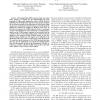88 search results - page 2 / 18 » Implementation of a Provably Secure, Smartcard-Based Key Dis... |
ENTCS
2006
13 years 5 months ago
2006
We present the first cryptographically sound security proof of the well-known Otway-Rees protocol. More precisely, we show that the protocol is secure against arbitrary active att...
ICDCS
1998
IEEE
13 years 9 months ago
1998
IEEE
This paper considers the problem of key agreement in a group setting with highly-dynamic group member population. A protocol suite, called CLIQUES, is developed by extending the w...
PERCOM
2007
ACM
14 years 5 months ago
2007
ACM
Group Key Agreement (GKA) protocols enable the participants to derive a key based on each one's contribution over a public network without any central authority. They also pr...
CCS
2008
ACM
13 years 7 months ago
2008
ACM
The standard solution for user authentication on the Web is to establish a TLS-based secure channel in server authenticated mode and run a protocol on top of TLS where the user en...
CORR
2010
Springer
13 years 2 months ago
2010
Springer
The Hopper-Blum (HB) protocol, which uses noised linear parities of a shared key for authentication, has been proposed for light-weight applications such as RFID. Recently, algorit...



